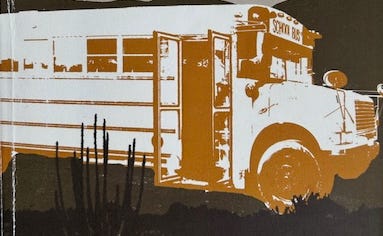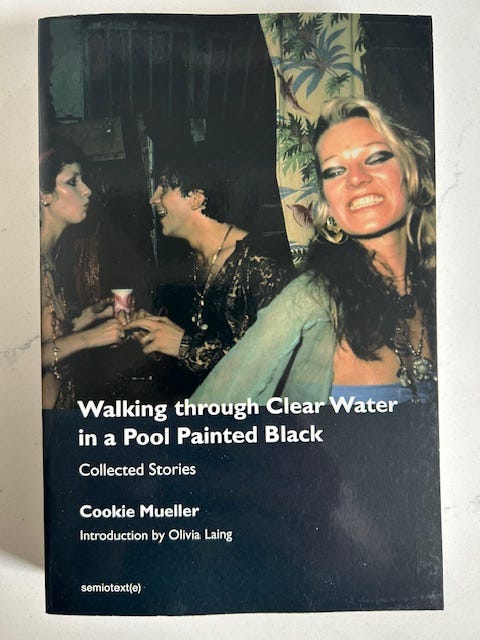'The Dog of the South' by Charles Portis
A novel about a road trip that I read while on a road trip.—Review #235

Donna and I are just back from a Southwest vacation where we attended a wedding in Sedona and then drove from Arizona to New Mexico to Texas and back. It was great—we love road trips—but it was HOT. Seriously, the sun was relentless. I was like:

But it also was beautiful. I mean, look at this sunset over Tucson:
Of course, we visited several book stores and picked up a few books, including ‘The Dog of the South’ by Charles Portis. (I’ll tell you about the other books over the summer as Books on GIF goes weekly for July and August. I’ll share roundups of recent additions to my TBR, and you can vote on what I should review next. Book reviews still will publish every other Sunday, per tradition.) I had wanted to return to Portis after reading ‘True Grit’ last year, and figured I would dive into this book once I was back in New York since I had brought another book on the trip. But the idea of reading a book about a road trip while on a road trip was too good to skip, and after scanning the first few paragraphs of this fascinating, quirky and humorous novel, which you’ll see below, I was hooked.
Here’s the book’s cover:

Ray Midge has a quest. His wife, Norma, has run off with her ex-husband, Guy Dupree, who also was Ray’s coworker. They took Ray’s credit cards, one of his guns and his well-maintained Ford Torino, and vanished. They left behind Dupree’s jalopy of a Buick, which has a hole in the floor where you can see the road and a steering wheel that offers dubious control. It also bleeds transmission fluid. Ray knows that when his credit-card bills arrive, he’ll have a trail to follow. He wants his Ford back, that’s for sure. And Norma, too, maybe. While awaiting the bills, he wonders what could possibly have gone wrong between him and his wife. He offered a stable life. He liked things quiet and to stay close to home, reading history books and more history books. Sure, he was 26 and directionless, jumping from college to college and degree program to degree program, but he was close to finding his true path. His job as a copy editor on a local newspaper is by no means the zenith of his career aspirations. So why would she leave? Especially with Dupree, a creepy, ugly, weirdo who once wrote so many threatening letters to Washington that he got in trouble with the law. Ray’s like:

The bills come and Ray plots their path: They’re headed to Mexico. He packs the Buick with transmission fluid, his wife’s silverware, a wad of savings bonds and another of his guns, puts on a shirt and tie, and leaves Little Rock, bound for the border. Along the way, he encounters an array of colorful characters. There’s the hard-drinking, Chrysler-driving bondsman who’s also after Dupree for jumping bail. There’s the guy dressed like a clown who torments bar patrons and motel guests. And, most importantly, there’s Dr. Reo Symes, a disgraced former doctor who’s also a rambling storyteller and con man that Ray meets in Mexico. After Ray realizes Norma and Dupree have pushed farther south, he learns that Symes is headed in the same direction, on his way to visit his mother in a religious community. Ray and Symes link up, ostensibly to split the driving and the cost, and they:

Once in Belize, (which Ray also calls British Honduras, a monicker the country ditched in 1973), Ray’s search for Norma and Dupree continues in earnest. I won’t divulge what happens, but the twists and turns of his journey involve a dilapidated hotel with surly staff, Mayan ruins, a Tarzan movie, a hurricane and a debate over land use in Louisiana. It’s a lot for Ray to take in, and the reader, too, and he often gets sidetracked by the people he encounters. At times, I felt both he and I were like:

I enjoyed ‘The Dog of the South.’ It is a crazy and riveting story, and I like Portis’s odd and vividly rendered characters. (I especially liked that Ray and Dupree had worked on a copy desk, a job I know from personal experience to be a gathering place of vivid characters.) I also like how the book offers an offbeat exploration of loneliness and the often-misguided acts that causes us to take. Sometimes we get into marriages that don’t work. Sometimes we connect with strangers, potential friends—but it doesn’t last. Sometimes we lack the emotional intelligence to see what others are going through, or the self awareness to be honest about our own feelings, and we talk past each other. This book would be depressing if it wasn’t so humorous. Still, it had my feelings in a spin, like:

As I understand it, every Portis fan has their favorite novel of his. For some, it’s ‘The Dog of the South.’ For me, it remains ‘True Grit.’ Portis’s writing is beautiful and, as in ‘True Grit,’ he crafts a unique and unforgettable voice for his protagonist. The story also speeds along, for the most part, like a car crossing a desert. Even so, there are parts where things get bogged down as Ray spins his wheels—sometimes, I zoned out or found myself looking at my phone. But this is a minor quibble, likely induced by my own long hours on the road which undermines reading concentration. I’m glad I read ‘The Dog of the South’ on the trip. I was invested in Ray’s journey, and I loved meeting the eclectic people he encounters. If you’re looking for a light but meaty vacation read, check out this book.
An opening excerpt:
My wife Norma had run off with Guy Dupree and I was waiting around for the credit card billings to come in so I could see where they had gone. I was biding my time. This was October. They had taken my car and my Texaco card and my American Express card. Dupree had also taken from the bedroom closet my good raincoat and a shotgun and perhaps some other articles. It was just like him to pick the .410—a boy’s first gun. I suppose he thought it wouldn’t kick much, that it would kill or at least rip up the flesh in a satisfying way without making a lot of noise or giving much of a jolt to his sloping monkey shoulder.
When the receipts arrived, they were in lumpy envelopes and the sums owed were such that American Express gave way to panic and urged me to call B. Tucker in New York at once and work out terms of payment. It was my guess that this “Tucker” was only a house name, or maybe a hard woman who sat by a telephone all day with a Kool in her mouth. I got out my road maps and plotted the journey by following the sequence of dates and locations on the receipts. I love nothing better than a job like that and I had to laugh a little as the route took shape.
What a trip. What a pair of lovebirds! Pure Dupree! The line started in Little Rock and showed purpose as it plunged straight down into Texas. Then it became wobbly and disorderly. There was one grand loop that went as far west as Moffit’s Texaco station in San Angelo, where sheep graze, and there were tiny epicycles along the way that made no sense at all.
My rating:

‘The Dog of the South’ by Charles Portis was published by Alfred A. Knopf in 1979 and by The Overlook Press in 1999. 253 pages, including afterword by Ron Rosenbaum. $15.81 at Bookshop.org.
What’s next:
Next week, I’ll share the books I bought for my birthday and for BoG’s 8th anniversary, and ask you which I should review. The following week’s newsletter will feature:
Before you go:
ICYMI: Review #234
Read this: Donna recently had a personal essay published. It’s powerful, heartbreaking and beautiful, and I’m so proud of her for telling this difficult story. Check out her writing on The Keepthings.
Read this, too. I didn’t have time to get to it before finishing this newsletter, but I plan to read Jonathan Lethem’s piece about Charles Portis in the New York Review of Books. Here’s the link to ‘Grand Poobah of the Antigrandiose.’
Thanks for the shoutout! We were so excited to hear Eve and Kathryn mention BoG on their podcast, Something We Read, and to see our newsletter linked in Martha’s Monthly and in The Booktender’s ‘Bookstack Directory.’ Donna and I appreciate the support and the kind words, friends!
If you enjoyed this review:
Thanks for reading, and thanks especially to Donna for editing this newsletter!
Until next time,

Mike









I do love a good road trip novel. The first novel I ever wrote was a road trip novel. It's flawed and broken, but I still love it.
I'm currently reading A Month in the Country and GREATLY enjoying it. The narrator is delightful, and I'm curious where the story is going.
For would-be novelists out there, Portis is a good one to study. Take a look at that almost perfect opening paragraph you quote above. Portis was a journalist, and he gives us most of the who-what-when-where-why stuff. But note how he also generally avoids the use of unnecessary ad-words (adjectives and adverbs) in this first paragraph, until the very end that is, when he nails Dupree with “his sloping monkey shoulder.”
Portis’s other novels would probably be better known if he hadn’t written an almost perfect one in True Grit. How do you follow that? The voice in True Grit is so distinctive and so American that it’s no wonder two film adaptations were made of it. Yet few people seem to know there was a novel behind the films.